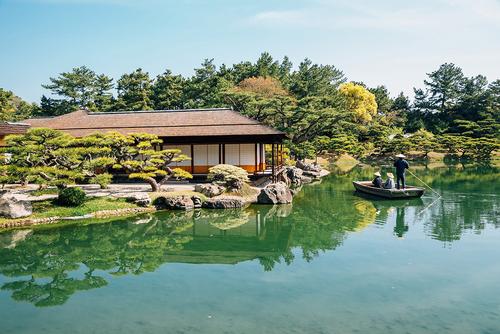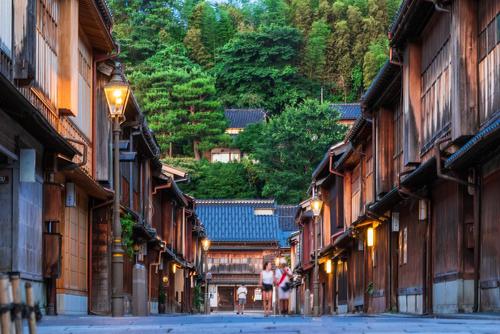Japan is an island nation surrounded by the sea and blessed with abundant nature. One of the defining characteristics of Japanese culture is the idea of not going against nature and instead following the natural flow.
On the other hand, Western culture has been built on the idea that death, which occurs in the natural course of events, is something that can be regenerated.
In this article, we will explain the characteristics of Japanese culture, which is faithful to this view of nature, and the differences between it and Western culture, so let's learn about Japanese culture, which is often forgotten in modern society.
Japanese culture has developed uniquely while remaining close to nature

The origins of Japanese culture date back to the Jomon period, when the ancestors of the Japanese people lived in nature and never went against it. The reason for this is that the power of nature is far greater than that of humans, and this is said to be the idea of "emptiness" that is also a Buddhist teaching, and Japanese culture has been built around the idea of death being the natural state of animals.
On the other hand, in the West, a culture has been established in which the human soul seeks an eternal body, leading to the creation of mummies and huge stone cemeteries, and the idea of recreating death.
Japanese culture is thought to have originated as a way for Japanese people to assert to other countries that "we are Japanese," and it became widespread in Japan mainly from the end of the Edo period through the Meiji era.
At that time, it was Fukuzawa Yukichi who clarified what Japanese culture was.
During the Edo period, when Japan's isolation ended, Yukichi Fukuzawa traveled to Europe to participate in expositions in America and the Netherlands for academic research, making him one of the few Japanese people to do so. He was stunned by the sights he saw in Europe (the Netherlands). While Japan was still in the Edo period, with its Edo Castle and rows of traditional Japanese houses, he couldn't help but be amazed by the reality of glass-walled buildings and newspapers with a circulation of over 300,000 in the Netherlands.
And I thought that in order to preserve and pass on Japan's unique culture, we had to disseminate something that would be accepted by Western countries.
After returning to Japan, Fukuzawa Yukichi founded Keio University and published many books to spread knowledge about Meiji-era politics and his experiences abroad.
Because of the desire to preserve the traditional Japanese arts of that time, tea ceremony, Japanese dance, flower arranging, Noh theater, and pottery remain in modern society and have characteristics that differ from Western culture.
Japanese culture and Western culture have completely different characteristics

Japanese culture and Western culture have completely different characteristics.
Japanese culture was born from the books of Fukuzawa Yukichi during the Edo period, and many of the ideas that remain to this day are still popular today. However, what about Western culture? Below, we will explain the differences between Japanese culture and Western culture.
Japanese culture has developed in its own unique way despite being influenced by other countries
Japan is a country that has absorbed many cultures and technologies from neighboring countries such as China and Korea since the Jomon period. However, what is the background behind the unique development of Japanese culture despite being strongly influenced by these countries?
One possible reason for this is that many different ethnic groups have coexisted across the vast surface area of the Japanese archipelago, and the peoples living on the sea, in the mountains, and on the plains have shared their wisdom with each other.
Japan is also a master of quickly accepting foreign cultures, but the Japanese people and each ethnic group have adopted or not adopted that culture, or have improved it to suit their own purposes.
As a result, although the various ethnic groups from Hokkaido to Okinawa were passive in accepting other cultures, Japan had the strength to live in harmony and not lose its identity no matter how much influence it received from other countries, and this is why Japanese culture, which continues to this day, has remained intact since ancient times.
Differences in the characteristics of Western culture, which is a continental culture, and Japanese culture, which is an island nation
Western culture, which is a continental culture, and Japanese culture, which is an island nation, have many differences in characteristics, not only in general customs and diet, but also in religion and thought patterns.
Below we will explain the differences in their features.
·religion
Japan's religion, Buddhism as we know it today, originated in ancient India and was introduced to Japan via China and Korea. However, unique Japanese ideas were added to Buddhism, transforming it into a religion in which people "feel" the power of God. On the other hand, religions in Western culture are religions in which people "believe" in the teachings of Jesus Christ, so there are major differences between Japanese culture and Western culture.
・Architecture
Japanese architecture primarily uses wood, a lightweight material that is made strong through technology, while Western culture uses a lot of stone and metal, which are heavier but stronger than wooden structures.
・Habits
Japan is an island nation, and because of its history of isolation, the people here are not very communicative. However, Western culture is characterized by the ability to actively interact with anyone, such as by shaking hands or hugging.
・Diet
Since Japan is surrounded by the sea, its food culture is dominated by a self-sufficient diet that includes eating a lot of fish and growing rice and vegetables through agriculture.In contrast, Western food culture is centered on wheat and meat, and people eat bread and beef from livestock.
・Thinking patterns
As an Asian people, the Japanese are a race that values harmony and excels in cooperative thinking, while Westerners are a race that is full of curiosity, seeking to understand the essence of everything, and excels at communicating.
How to interact with nature
Japan is prone to earthquakes and tsunamis, and the Japanese people are keen to coexist with natural threats, which can be said to be the essence of Japanese culture. On the other hand, in the West, the attitude is that natural threats are confronted and controlled by humans, which is a different way of thinking from Japan.
summary
The personality and behavior of Japanese people are influenced by traditional Japanese culture, even today. As an island nation with few opportunities to come into contact with other countries, Japan has developed its own unique culture, including customs, diet, and thought patterns.
The fact that culture has been passed down in Japan to the present day is probably due to the results of Fukuzawa Yukichi's research during the Edo period.
If Fukuzawa Yukichi had not thought about preserving the arts and crafts, Japan's traditional culture may not have existed to this day. I believe that Japanese culture and arts, which have been passed down to this day without losing their luster, must be passed down by Japanese people living today for the future.
I would love for many foreigners to learn about Japan's good old culture.
This article has been partially re-edited by KARUTA from an article originally published on "Nihongo Biyori."
Any unauthorized reproduction or use of the contents, text, images, illustrations, etc. of this website is strictly prohibited.
